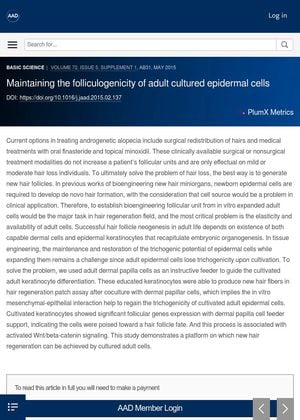Maintaining the Folliculogenicity of Adult Cultured Epidermal Cells
May 2015
in “
Journal of The American Academy of Dermatology
”

TLDR The research shows a potential way to regenerate hair using adult cells that have been grown and guided to produce new hair fibers.
The 2015 study "Maintaining the folliculogenicity of adult cultured epidermal cells" explored a new approach to hair regeneration. The researchers found that current treatments for androgenetic alopecia, such as surgical redistribution of hairs, oral finasteride, and topical minoxidil, were only effective for mild to moderate hair loss and did not increase the patient's follicular units. The study proposed a solution to hair loss by generating new hair follicles using bioengineered follicular units from in vitro expanded adult cells. The main challenge was maintaining the hair-growing potential of these cells during expansion, as adult epidermal cells typically lose this ability when cultivated. To overcome this, the researchers used adult dermal papilla cells to guide the differentiation of the cultivated adult keratinocytes. These "educated" keratinocytes were able to produce new hair fibers after being co-cultured with dermal papilla cells. This process was associated with activated Wnt/beta-catenin signaling. The study demonstrated a potential platform for hair regeneration using cultured adult cells.





